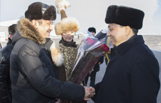Abe vows to revise pacifist Constitution
(Xinhua) Updated: 2014-12-25 11:02Some ministers in Abe's cabinet launched in September after a reshuffle, including Eto, were involved in political fund scandals, which forced two women ministers to resign.
Local reports said the new lineup is aimed at pushing forward the economic policy and drafting the government's budget for next year as quickly as possible, as well as accelerating the legislation related to the right to collective self-defense.
"I don't think it is necessary to carry out an all-out reshuffle again as I just did it three month ago. I think the cabinet members could work together to get bills passed in the ordinary Diet session next year," Abe said.
Meanwhile, Japan's opposition parties continued to criticize Abe and his policy, with Yukio Edano, secretary general of the Democratic Party of Japan (DPJ), saying that his party would confront Abe head on.
"The DPJ has heavy responsibility as the largest opposition party. It is more important for all opposition party to cooperation," he said, blaming Abe's attempt for the constitutional revision and the Special Secrecy Law.
A senior official of the Japanese Communist Party, Yoshiki Yamashita, accused Abe of trying to forcibly carry out his policies, like another sales tax hike and Abenomics, warning the move would trigger public outcry.
"Voters give our party great confidence in the election, and we will fully use the expanded power to counter Abe's 'runaway policies,'" he said.






